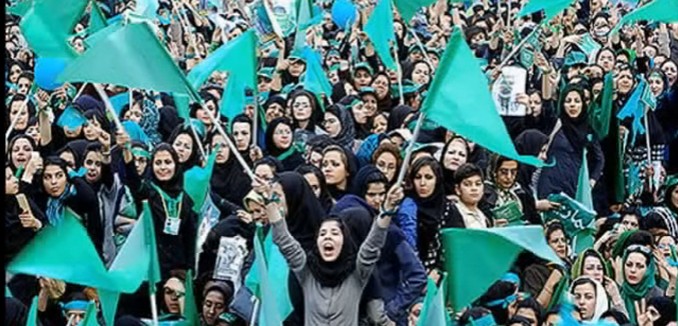President Barack Obama didn’t support the pro-democracy “Green Revolution” protests that swept Iran after its disputed 2009 presidential election because he feared that they would “sabotage his secret outreach to Iran,” Bloomberg View columnist Eli Lake wrote on Wednesday.
In his review of The Iran Wars, a new book by Wall Street Journal chief foreign correspondent Jay Solomon, Lake noted that it was “well known” that Obama did not react quickly to the protests that broke out on June 12, 2009 following the announcement that Mahmoud Ahmadinejad had been re-elected as Iran’s president. Obama minimized the significance of the protests, saying simply on June 15, “The world is watching and inspired by their participation, regardless of what the ultimate outcome of the election was,” without even giving credence to the widespread belief that the election had been stolen.
“Behind the scenes,” Lake wrote, “Obama overruled advisers who wanted to do what America had done at similar transitions from dictatorship to democracy, and signal America’s support.”
Solomon noted in his book that the White House instructed the CIA to offer no help to the protesters. “The Agency has contingency plans for supporting democratic uprisings anywhere in the world. This includes providing dissidents with communications, money, and in extreme cases even arms,” Solomon wrote. “But in this case the White House ordered it to stand down.”
Lake compared Obama’s response to Iran’s green revolution to that of other U.S. administrations during recent instances of democratic opposition to dictators. In 2000, the State Department ran a program to train Serbian activists to resist their dictator, Slobodan Milosevic. Eventually, the popular uprising forced Milosevic from power. In 2003, after a contested election, President George W. Bush sent an envoy to Georgian President Eduard Shevardnadze to urge him to resign peacefully, which he did. Obama, Lake further pointed out, similarly offered support for pro-democracy movements in Egypt in 2011 and Ukraine in 2014.
In contrast to these other cases, Lake wrote, Obama had an “obsession” with trying to turn Iran’s “ruling clerics from foes to friends.” Obama went so far as to repeatedly reassure Iranian Supreme Leader Ayatollah Ali Khamenei that he did not seek to overthrow his regime, and even terminated American programs to document human rights abuses in Iran.
Ultimately, this outreach resulted in last year’s nuclear deal, which contained favorable terms for Iran. Whereas the U.S. said at the outset of the negotiations that it sought to take apart most of Iran’s nuclear infrastructure, Solomon wrote that by the end, American negotiators had “agreed that Iran would then be allowed to build an industrial-scale nuclear program, with hundreds of thousands of machines, after a ten year period of restraint.”
While there is no guarantee that the 2009 uprising would have been successful with American intervention, Lake observed, supporting it “was worth a try.”
During an interview with Andrea Mitchell of MSNBC earlier this week, Solomon said that another consequence of Obama’s diplomacy with Iran was U.S. inaction in the face of the lethal 2013 chemical weapons attack launched by Syrian dictator Bashar al-Assad in a Damascus suburb. “U.S. and Iranian officials have both told me that they were basically communicating that if the U.S. starts hitting President Assad’s forces, Iran’s closest Arab ally — sort of the ability to project their power through the Middle East into Lebanon and the Palestinian territories — these talks could not conclude,” Solomon said. “The IRGC, the Revolutionary Guard would not accept a continued engagement with the U.S. if their closest ally was being hit.”
[Photo: ava s / YouTube ]




